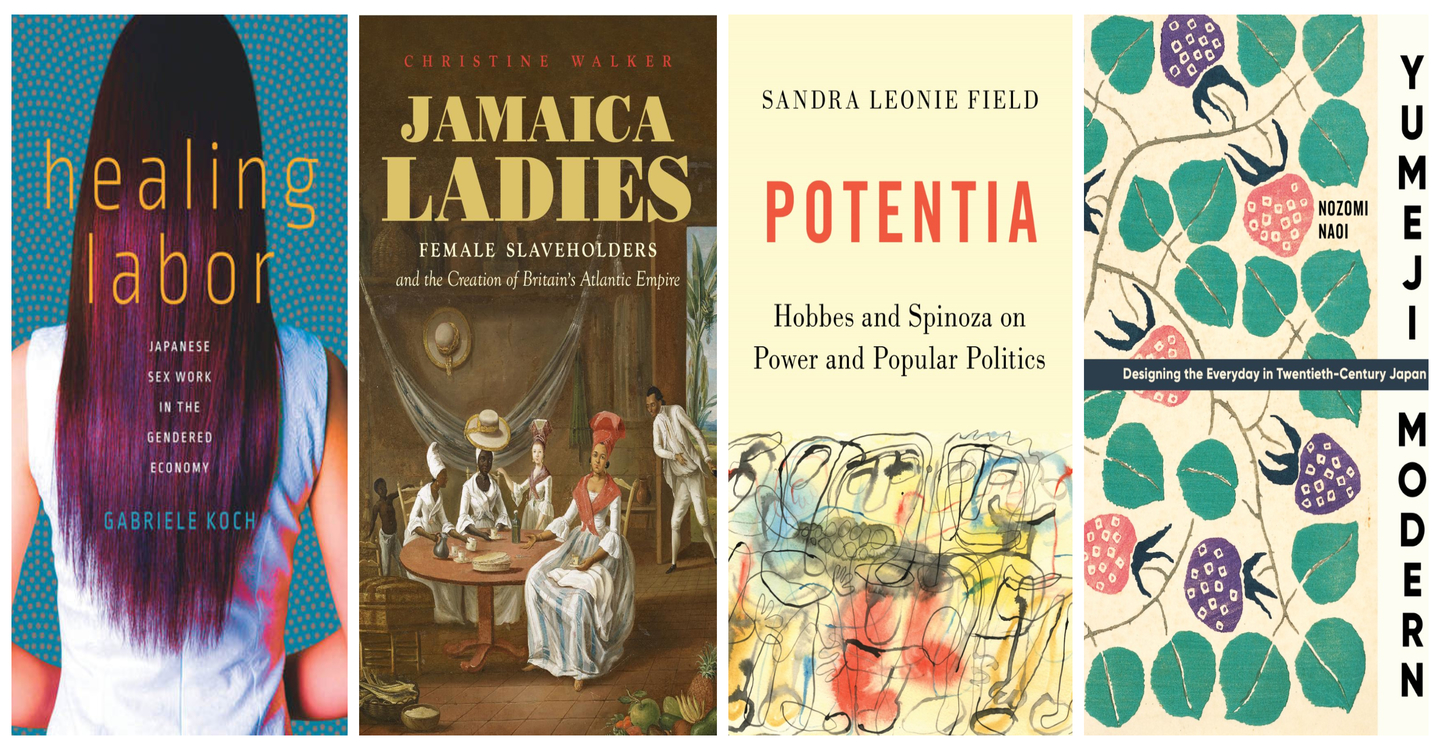Humanities and Social Sciences faculty publish new books on politics, history and anthropology
 Images provided by Gabriele Koch, Christine Walker, Sandra Field, Nozomi Naoi.
Images provided by Gabriele Koch, Christine Walker, Sandra Field, Nozomi Naoi.
Research is a core activity that contributes to and complements teaching excellence in our community of learning. Faculty members from across academic divisions – humanities, social sciences, and natural sciences – all carry out extensive research in their respective fields. Recently, several Humanities and Social Sciences faculty members published books on their research.
Assistant Professor of Humanities (Philosophy) Sandra Field, a political philosopher, is interested in both contemporary and historical political thought, theory and philosophy. Her new book Potentia: Hobbes and Spinoza on Power and Popular Politics will be published by Oxford University Press on 1 August this year. The book explores the concept of popular power, which is often celebrated as a longstanding solution to unjust social orders. The book challenges this conception of popular power, highlighting that its outcomes can often be equally dissatisfying.
Asst Prof Field said, “It seems that popular power can sometimes turn ugly and violent. Sometimes you can have a populace which just doesn’t seem to be that powerful at all. My motivation for writing this book was to try to offer a conception of popular power that does not ignore the messiness and imperfection of human societies.”
In the book, she argues that the meaning of popular power needs to be rethought. By utilising Thomas Hobbes’ and Benedict de Spinoza’s political philosophies of repressing private power and civic strengthening, she offers a new concept of popular power.
When arguing in favour of popular power, writers often use Hobbes and Spinoza as their theoretical base. In the process of examining these foundational texts, Asst Prof Field discovered that they surprisingly also offer a basis for a more holistic concept of popular power, one which encompasses the good and bad.
Assistant Professor of Humanities (History) Christine Walker, recently had a book published in June 2020. Jamaica Ladies: Female Slaveholders and the Creation of Britain’s Atlantic Empire is the first book ever to carry out a thorough study of free and freed women (former slaves) of European, Euro-African, and African descent who participated in the Jamaican slave trade during British colonial rule. It depicts both female colonists and free women of African descent using slavery to advance socially and financially.
Jamaica Ladies began as an unexpected discovery in the archives during Asst Prof Walker’s research for her graduate degree. She said, “I found a collection of letters written by a woman living in Haiti (formerly the French colony of Saint-Domingue) more than a century ago. This woman owned and managed a coffee plantation where she coerced numerous enslaved men, women, and children to labour for her. Her activities challenged much of the received wisdom about slavery and settler colonialism. I wanted to find more women like her, and I decided to focus on Jamaica because it was the wealthiest colony with the largest enslaved population in the British Empire.”
Not only does the book challenge common conceptions of the slave trade as perpetuated primarily by white men, it also disputes broader narratives of women as oppressed victims and passive bystanders in history. Instead, it shows women as active participants in and beneficiaries of historical events.
Moving away from British colonial history, Assistant Professor of Humanities (Art History) Nozomi Naoi, who specialises in Japanese visual culture, graphic design and art history, had her first book published by the University of Washington Press in July 2020. Yumeji Modern: Designing the Everyday in Twentieth Century Japan focuses on the leftist and anti-war graphic illustrations of popular Japanese artist Takehisa Yumeji (1884–1934). In Yumeji Modern, Asst Prof Naoi explores Yumeji’s work from the start of his career in 1905 to its peak in the 1920s.
Having long been attracted to the modern era of Japan’s history, Asst Prof Naoi wanted to understand how early-twentieth-century Japanese artists visualised modern Japan. Her work for this project started in 2011, when she was pursuing her graduate degree at Harvard University. During this time, she spent two years in Japan visiting museums dedicated to the works of Yumeji.
The last chapter of her book is dedicated to Yumeji’s series on the Great Kanto Earthquake of 1923, which she analyses against the backdrop of the 2011 Tohoku earthquake which struck north-eastern Japan during her stay in Tokyo.
On the subject of Japanese culture, Assistant Professor of Social Sciences (Anthropology), Gabriele Koch, recently published a book on the Japanese sex industry and the way in which Japanese sex workers conceptualise sex. The book, called Healing Labour: Japanese Sex Work in the Gendered Economy, was published in February 2020. It argues that Japanese sex workers thought of sex as a feminised form of care or ‘healing labour’ that was integral to the well-being and productivity of Japanese men.





